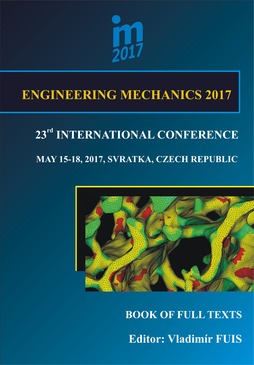Proceedings Vol. 23 (2017)

ENGINEERING MECHANICS 2017
May 15 – 18, 2017, Svratka, Czech Republic
Copyright © 2017 Brno University of Technology, Faculty of Mechanical Engineering, Institute of Solid Mechanics, Mechatronics and Biomechanics, Brno
ISSN 1805-8248 (printed)
ISSN 1805-8256 (electronic)
list of papers scientific commitee
pages 410 - 413, full text
In order to design an optimal experimental setup the designers have to take into account uncertainties connected to the investigated system. The input random factors associated with for example values of loading, specimen dimensions or measurement errors influence behaviour of the system, which thus becomes also uncertain. From this point of view, the experiment design is a very important because it effects amount of information which can be obtained from the experiment. More specifically, accuracy of the identified parameters from indirect experimental measurements depends on experimental settings. In this contribution we demonstrate a role of random factors in a nonlinear model calibration on an illustrative example of one dimensional heat conduction. The thermophysical parameters such as thermal capacity and thermal conductivity are identified on a basis of noisy measurements from experiments with different setup. The experiments vary in a number of sensors and number of observed time steps. The presented statistical analysis shows dependence of the parameter estimation on the choice of measured quantities involving different uncertainties.
back to list of papers
Text and facts may be copied and used freely, but credit should be given to these Proceedings.
All papers were reviewed by members of the scientific committee.

 Powered by
Imce 3.20 © 2023, Pavel Formánek, Institute of Thermomechanics AS CR, v.v.i. [generated: 0.0117s]
Powered by
Imce 3.20 © 2023, Pavel Formánek, Institute of Thermomechanics AS CR, v.v.i. [generated: 0.0117s]